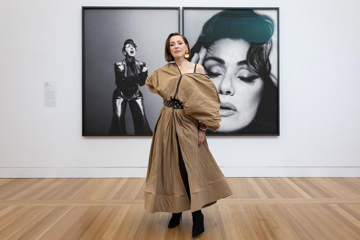Just Because Nathaniel Rateliff's Music Isn't Religious Doesn't Mean It's Not Spiritual
Nathaniel Rateliff, bandleader of his Night Sweats, tells Anthony Carew about the loss of their producer and collaborator Richard Swift, and how the pair had plans to make a record on their own.

Nathaniel Rateliff & The Night Sweats, a Colorado crew fronted by its titular soulful singer-songwriter, have made both of their albums with the late studio wizard Richard Swift. So much of their thick, vintage, analogue sound – on the band’s self-titled 2015 debut and 2018’s Tearing At The Seams – came from Swift, and his unerring ability to sonically tap into the past. Swift passed away four months after the release of the latter LP, and, in the wake of his death, Rateliff harbours both fond memories and a heavy heart.
“I loved him,” says Rateliff, 40, when he recalls working with Swift. “I’ve never laughed so much [as when working with him]. We all did, we all really loved Richard. It’s been really hard losing Richard. I miss him, man. We had intended on doing a lot more work together. He could make something mediocre sound like the coolest thing you’ve ever heard. Even now, I listen back to a lot of the stuff [we did], try to learn from the things he taught me when we were working together, when we had the time to work together. He had a way of making things so cool without ever trying to be cool.”
‘Cool’ is not something Rateliff ever felt he was, or could attempt to pull off, when he was young. He grew up in rural Missouri before moving to Denver as a teenager with friend and fellow music obsessive, Joseph Pope, bassist in the Night Sweats. “That’s when I discovered a lot of music from the ’50s to the ’70s: blues, honky-tonk, country, bluegrass, samba, bossa nova,” Rateliff recounts. “I love all of that stuff. I was really into oldies. Me and Joseph, we’d drive around listening to the oldies station. We certainly didn’t have girlfriends, and we certainly weren’t cool. It was just me and him driving around for hours on end, listening to The Everly Brothers.”
Before that, Rateliff’s musical experiences had been in the church, where his family played in a gospel band, and Rateliff played drums. Rateliff hasn’t been to church since his youth – “I got really into history, and that doesn’t really work well with religion” – and has mixed thoughts on how often writers make the connection between his gospel youth and his soulful musical output. “I hear a lot of people who relate me growing up in the church to the music that I make now. But the music that we played [in church] wasn’t anything like we were in the Southern Baptist church, or the Staple Singers.”
There’s nothing religious about the Night Sweats’ music, but Rateliff can see it as spiritual. “There’s definitely a spiritual element to music. There’s something about music that is bigger than the individuals making it. And there’s some weird, inexplicable thing that happens when you all get to do it together.”
Don't miss a beat with our FREE daily newsletter
The Night Sweats are famous for their live shows, and, in turn, making Tearing At The Seams, the goal was to try and have the production as live off the floor as possible. Once the record was finished, Rateliff and Swift were immediately thinking about where to head next. “As soon as we finished Tearing At The Seams, I was talking to Richard about what we were going to do next. Richard and I were talking about doing a kind of offshoot of the Night Sweats, just him and myself were going to make a record. But, as for the Night Sweats, I’ve been thinking about it for a year, now, been writing a bunch of songs.”
There won’t be new jams played on their imminent Australian tour – Rateliff just hopes to deliver Tearing At The Seams with a fury. As someone who’d never left North America before touring took him over oceans, he’s looking forward to returning to a country he’d never thought he’d ever get to visit. “It’s a beautiful country, and I’ve had nothing but good times [in Australia]. But, actually, I’ve been trying to have less of a good time, lately,” Rateliff laughs. “The problem with being in a band is that you can find yourself having too much of a good time too often.”







